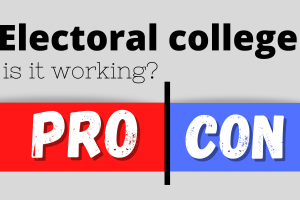An undemocratic solution
October 8, 2020
“What’s the point of voting if the popular vote doesn’t determine the presidency?”
I remember asking my mom that question as a middle schooler, utterly perplexed that in our American democratic system we couldn’t directly choose our president, the commander in chief, the top dog of U.S. politics- it just didn’t feel fair.
It wasn’t until many years later I reconciled the crux of my confusion- it isn’t meant to be democratic, because it’s not part of a democratic system.
Referencing governmental systems other than democracy often stirs up fear in American patriots’ hearts, “You don’t mean fascism, or dare say socialism, do you?” But there is an option that doesn’t fall in either of these polar political fields, what America primarily is, a constitutional republic.
In a constitutional republic, an elected, selective group of individuals chooses the executive branch instead of the populous. “But for the people, by the people, right?” Yes, in many ways this is still true, but as quoted by our founding father John Adams, “I do not say that democracy has been more pernicious on the whole, and in the long run, than monarchy or aristocracy. …Remember democracy never lasts long.”
Adams wasn’t arguing for the absolution or complete abandonment of democracy; he argued that democracy, like any other form of government, was corruptible and needed a system of checks and balances. Thus was the birth of the electoral college.
As originally presented in the federalist papers, the electoral college is the group of elected officials that elect the president. The purpose of the electoral college is to act as a check on the populous- or prevent mob rule– and afford more power and emphasis to state governments.
The electoral college gives more power and voice to states with smaller populations, thereby preventing the majority from dictating over the minority. For example, California and Wyoming have a population ratio of about 1:70. With the electoral college California receives 55 delegates while Wyoming gets three. This may seem like no change, but the ratio now becomes about 1:20.
This is important because now the people of Wyoming are not completely dominated by California or any other large states. This prevents regional ideas from being enforced across the nation based on the population of cultures.
The electoral college also exemplifies and exalts state power. Due to the age of technology, people feel more connected to Washington D.C. than ever. While this yields many advantages, such as a further inspection of the national government by the people, it can also cause citizens to negate the state government’s power in their heads.
Your state government and policies should be more influential in your life than the national; many problems can be resolved at local levels instead of using the federal branches to further extend the reach of national offices. The founding fathers wanted to emphasize the individual authority of states. Thus, you can directly elect the governor of your state, pleasing the majority of specific regions, without overstepping state bounds and inflicting your local rule on the nation as a whole.
A common argument against the electoral college is that it prevents third-party candidates from surviving in politics. In actuality, the electoral college encourages third party candidates to get a foot hole in state government first and work their way up to the national government- the Republican party made its way to the federal government by starting in the states. You directly elect congressmen and senators, and if a third party is reflected in these offices, then the presidency is viable.
The electoral college also prevents further voting fraud, blackmail, and mob mentality reflected in other direct democracies. A mob mentality creates the illusion that quantity equates moral quality and should be enforced as such. If each individuals’ vote directly chose the president, people would become targets and subject to biased pressuring.
The electoral college is only applicable under a dominating and unifying constitution. As long as the states agree on inalienable rights and the fortifying government restrictions outlined in the constitution, then the electoral college is forced to elect an official based on these parameters. The national popular vote is still crucial as it acts as a check on the electoral college, which is often chosen by a state’s party committee. If the people are displeased, they will reflect this in their direct election of state party candidates.
The electoral college is a fundamental check on American politics. It is founded on the belief that mob rule should never domineer over a national and that stronger sovereignty should be bestowed upon the states. It is hard to come to terms with not owning the direct power to elect the president, but as Adams states, “Individuals have conquered themselves, nations and large bodies of men, never.”



